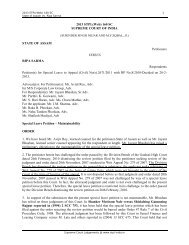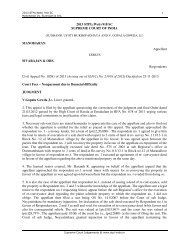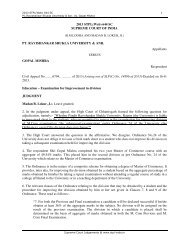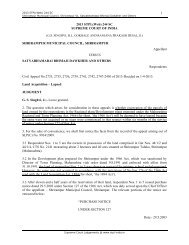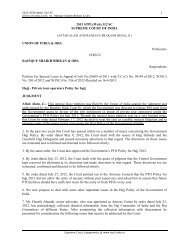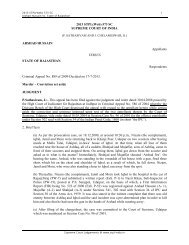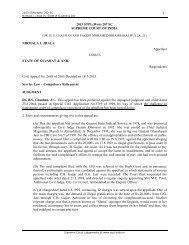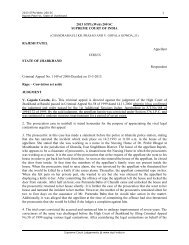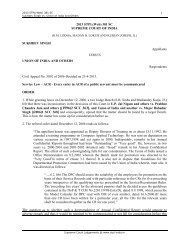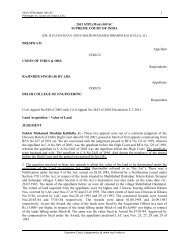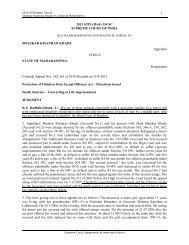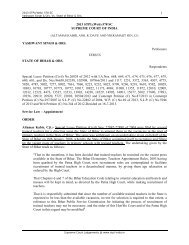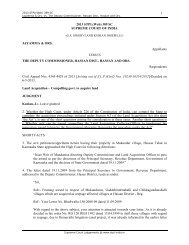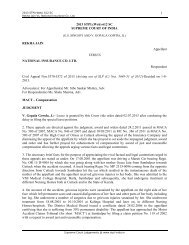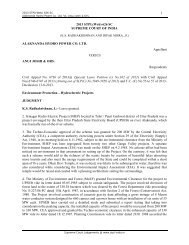Common Cause (A Regd. Society) Vs. Union of India - STPL ...
Common Cause (A Regd. Society) Vs. Union of India - STPL ...
Common Cause (A Regd. Society) Vs. Union of India - STPL ...
You also want an ePaper? Increase the reach of your titles
YUMPU automatically turns print PDFs into web optimized ePapers that Google loves.
2010 <strong>STPL</strong>(Web) 636 SC 2<br />
<strong>Common</strong> <strong>Cause</strong> (A <strong>Regd</strong>. <strong>Society</strong>) <strong>Vs</strong>. <strong>Union</strong> <strong>of</strong> <strong>India</strong><br />
He explained that the suggestions made by the petitioner mainly emphasized that the loans and<br />
advances must not be given without fully checking the creditworthiness and past record <strong>of</strong> the<br />
borrowers and that companies, which have been "willful defaulters" in the past or whose<br />
subsidiary companies and promoters have willfully defaulted in the past in repaying the loans and<br />
advances, should not be given fresh loans and advances. He also explained that the suggestions <strong>of</strong><br />
the petitioner also stress on the greater accountability <strong>of</strong> the bank <strong>of</strong>ficials and on the personal<br />
liability <strong>of</strong> the promoters by making personal guarantee <strong>of</strong> the promoters mandatory in every<br />
case. He vehemently argued that the <strong>Union</strong> Government could not possibly have any objection to<br />
these suggestions made by the petitioner and the reasons given in the affidavit <strong>of</strong> Shri Dharam<br />
Paul Bhardwaj, Under Secretary, Ministry <strong>of</strong> Finance, Department <strong>of</strong> Economic Affairs (Banking<br />
Division) filed on behalf <strong>of</strong> the <strong>Union</strong> Government for not accepting the suggestions are<br />
frivolous. On behalf <strong>of</strong> the petitioner, he urged the Court to issue appropriate writs and directions<br />
to the respondents to implement the suggestions made by the petitioner.<br />
4. Mr. Gopal Subramanium, learned Solicitor General for the <strong>Union</strong> <strong>of</strong> <strong>India</strong>, however, submitted,<br />
relying on the additional affidavit, that a number <strong>of</strong> steps have already been taken by the Ministry<br />
<strong>of</strong> Finance, Government <strong>of</strong> <strong>India</strong>, to address the issue <strong>of</strong> NPAs and bank frauds and these are:<br />
action taken under the Recovery <strong>of</strong> Debts due to Banks and Financial Institutions Act, 1993 (for<br />
short "the DRT Act") to recover the NPAs <strong>of</strong> Banks, the enactment <strong>of</strong> the Securitization and<br />
Reconstruction <strong>of</strong> Financial Assets and Enforcement <strong>of</strong> Security Interest Act, 2002 (for short "the<br />
SARFAESI Act") which empowers the banks to realize the securities furnished by the borrowers<br />
to the bank and to recover the loans and advances from the defaulted borrowers, the enactment <strong>of</strong><br />
the Credit Information Companies (Regulation) Act, 2005 which provides for the setting up <strong>of</strong><br />
Credit Information Companies for collection, sharing and dissemination <strong>of</strong> credit information,<br />
which will help in arresting fresh accretion <strong>of</strong> NPAs and framing <strong>of</strong> the rules under the Credit<br />
Information Companies (Regulation) Act, 2005, which would ensure that the Credit Information<br />
Companies collect, process and collate accurate and complete data relating to the borrowers, so<br />
that fresh loans and advances given to the borrowers do not become sticky. He submitted that<br />
besides the legislative measures, the Reserve Bank <strong>of</strong> <strong>India</strong> has been circulating a list <strong>of</strong> non- suit<br />
filed `doubtful' and `loss' borrowal accounts <strong>of</strong> Rs. 1 crore and above, on 31st March and on 30th<br />
September every year to the banks and financial institutions for their confidential use. He<br />
submitted that the banks and the <strong>Union</strong> Government also refer cases <strong>of</strong> bank frauds to the C.B.I.<br />
wherever considered necessary and appropriate and that the <strong>Union</strong> Government has set up in July,<br />
2003 the "Serious Fraud Investigation Office" (SFIO), which comprises <strong>of</strong>ficers specialized in<br />
various disciplines, such as Taxation, Customs, Central Excise, Information Technology,<br />
Company Law, Capital Market, Banking, Investigation/ Police, Forensic Audit, etc. and this<br />
expert and experienced body has already started functioning since October, 2003 and has been<br />
assigned a total <strong>of</strong> 51 cases <strong>of</strong> serious frauds up to 30.04.2008 out <strong>of</strong> which 30 cases have already<br />
been investigated and 18 cases are under investigation. He explained that SFIO is presently<br />
working under the existing provisions <strong>of</strong> the Companies Act but legislation will be brought to<br />
invest the SFIO with adequate reach and powers. He submitted that the Central Government has<br />
already constituted a Committee <strong>of</strong> Experts under the Chairmanship <strong>of</strong> the Ex-Deputy Governor<br />
<strong>of</strong> the Reserve Bank <strong>of</strong> <strong>India</strong> to make recommendations regarding the SFIO and the report <strong>of</strong> this<br />
Committee <strong>of</strong> Experts as and when received will be considered by the <strong>Union</strong> Government. He<br />
argued that since adequate mechanism presently exists to tackle the issue <strong>of</strong> NPAs and bank<br />
frauds and there has in fact been a sharp decrease in the level <strong>of</strong> NPAs in scheduled commercial<br />
banks from 4.4% <strong>of</strong> their net advances as on 31.03.2003 to 1.0% as on 31.03.2008, this Court<br />
should not issue any writs or directions, as prayed for, by the petitioner.<br />
5. In rejoinder, Mr. Prashant Bhushan submitted that the reduction in NPAs, as claimed by the<br />
<strong>Union</strong> Government, has come about by waivers, write-<strong>of</strong>fs, rescheduling <strong>of</strong> repayments,<br />
Supreme Court Judgements @ www.stpl-india.in



